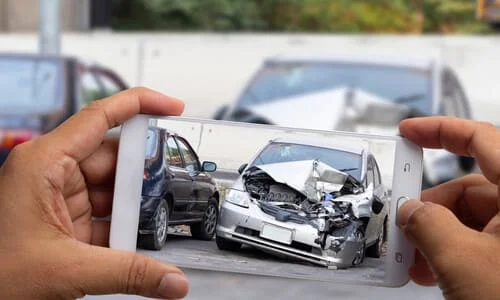 If you recently had a car accident in California, it’s important to understand the state’s rules and regulations when it comes to reporting the incident.
If you recently had a car accident in California, it’s important to understand the state’s rules and regulations when it comes to reporting the incident.
In any situation, it’s to your advantage to report the accident as soon as possible, both to law enforcement and to your own insurance company, as these actions can ensure you’re able to build a strong case with a high chance of recovering any damages you may be owed.
In addition, in California specifically, drivers are required to officially file form SR-1 with the California DMV for each person involved in the accident within ten days.
Similarly, all accidents involving injury or $1,000+ in property damage must be reported to the California DMV within ten days, and you must also call 911 or local law enforcement if anyone was injured or killed in the crash.
Again, it’s important to report the accident as soon as possible to the local authorities and both parties’ insurance companies, and in most cases, you’ll also want to contact a qualified personal injury attorney to help you navigate the next steps.
So start your search with Singh Ahluwalia Attorneys at Law. Our Fresno, California car accident lawyers can provide you with a clear, confidential, no-obligation case review right away. All you have to do is call (559) 878-4958 or contact us online to schedule your appointment today.
How to Report a Car Accident in California?
If you have been in a car accident in California, there are a few steps you must take to report it. First, check to make sure that no one has been injured, and then call 911 for assistance if needed.
Once the scene has been cleared and any medical needs have been addressed, it is important to follow the proper protocol for reporting your accident. Here’s what you need to do:
- Exchange contact and insurance information with all involved parties.
- File a written report with the California DMV within ten days of the accident if there is an injury, fatality, or property damage over $750.
- Obtain a copy of this report for your records or submit it to your insurance company.
- If there was an arrest made at the scene of the accident, notify your insurance company as soon as possible to ensure that all claims are properly filed and validated.
- Follow up with all involved parties and with their insurers or attorneys, if necessary.
- Contact law enforcement if any of the other drivers refused to provide you with their information or attempted to flee the scene after causing an accident resulting in injury or death.
- Contact an experienced personal injury attorney if you believe that you have grounds for a legal claim against any of the drivers involved in the crash and seek advice on how best to proceed with it.
By following these steps, you can ensure that your car accident is properly reported, which can help protect you from any legal actions taken against you by other drivers involved in the crash — or ensure that you’re able to recover any damages you may be owed.
Who Should I Report the Accident To?
You must report any auto accident that involves injury, death, or property damage over $1,000 to your local police department or the nearest California Highway Patrol station within 24 hours.
Filing an official crash report will come in handy when you file a claim with your insurance company, but it can lose evidential weight if you put off reporting the accident. Moreover, without the report, your possibility of getting full compensation will be greatly reduced.
Additionally, it will be to your advantage to report the incident to your insurance company as soon as possible.
By reporting the incident right away, you can ensure that all information about the accident is captured and documented correctly. However, exercise caution in what you disclose, and never agree to make a recorded statement.
When talking to any insurer — including your own but especially one representing an alleged at-fault driver — take care not to downplay the harm you’ve suffered or hint at any fault. Stick to reporting known facts, which can be limited to what is already available on the accident report.
Know that you can defer any communications to your attorney to avoid making common mistakes, such as answering leading questions in a way that may hurt your injury claim.
What Is Form SR-1?
Form SR-1 is a document used to report any kind of automobile accident that occurs on California roads, as well as any resulting damage or injury.
The following items should be included:
- Personal information for each driver involved in the accident (name, address, driver’s license number)
- Vehicle information for each vehicle involved (VIN, plate number, year/make/model)
- Location, date, and time of the incident
- Information regarding injuries and or property damage
- A narrative detailing what happened during the accident
- Names and contact information of witnesses (if applicable)
- Driver’s signature
Form SR-1 can be obtained from the DMV website or at any local DMV office. It is important to note that if you fail to complete Form SR-1 within ten days of your car accident, you may face legal penalties.
Off-Highway Vehicle Accidents
If you’ve been involved in an accident with an off-highway vehicle such as a dune buggy, ATV, dirt bike, etc., you are required to report the incident to the appropriate authorities immediately or within 24 hours and submit an accident report to the DMV.
This is especially the case if there has been a related injury or death. Again, you must also complete the same SR-1 form and submit it to the DMV within ten days of the accident.
Other California Car Accident Laws to Watch Out For
In California, there are four primary laws that mandate a driver to report a car accident. These are as follows:
- CVC § 20008: If an accident results in injury or death, drivers must report the incident to the California Highway Patrol (or local police) within 24 hours. The driver will also be required to file a written report, but if a police officer responds to the accident, they will file the report.
- CVC § 20010: In the case of a serious injury, if the driver is unable to make a report, any passengers who were in the vehicle at the time of the accident must make the report.
- CVC § 16000: If the car accident results in injury, death, or property damages that amount to over $1,000, the incident must be reported to the DMV within ten days.
- CVC § 16002: If the accident took place while the driver was in a company vehicle, the relevant employee is required to report the incident within five days.
What Happens if I Don’t Report a Car Accident in California?
In addition to the laws outlined above, two major codes outline the penalties a driver will face if they fail to report the accident.
- CVC § 16004: If a driver does not report the incident, the DMV has the right to revoke their driving privileges until you file the relevant report.
- CVC § 20001: If the driver does not report the accident to the police, they may face up to a year in jail as well as a fine that can range between $1,000 – $10,000. Similarly, if the accident resulted in a serious injury or death, and the driver did not report the incident, they can face two to four years in prison, 90 days in jail, or a fine of $1,000 – $10,000.
What Is the Statute of Limitations in California on Reporting Car Accidents?
The statute of limitations is a time limit that determines how long you have to file a claim for compensation or damages. In California, you have two years from the date of the accident to file a claim or lawsuit against any person or entity deemed responsible for the accident.
That said, it is still essential that you report the accident as soon as possible after it occurs in order to preserve your rights and the strongest evidence relevant to your case.
In many cases, insurance companies may request a police report before agreeing to provide coverage for an accident.
Furthermore, witnesses may forget key details about an accident as time passes, making it difficult or impossible for them to provide accurate testimony concerning what transpired during an accident.
How Can a Personal Injury Attorney Help Me After I’ve Reported an Accident in California?
Reporting the accident is only the first step in recovering any damages incurred during the crash.
The next step will be to file a claim with your insurance company, as well as the other driver’s, and from there, you will likely have to negotiate with the company to secure the damages you’re after. A personal injury lawyer can help you by:
- Providing Legal Advice: A personal injury attorney can offer legal advice on the best course of action to take and guide you on the appropriate steps to follow to protect your rights.
- Investigating the accident: An attorney can conduct a thorough investigation of the accident scene, review the police report, interview witnesses, and gather other evidence to build a strong case on your behalf.
- Negotiating with insurance companies: An experienced personal injury lawyer can negotiate with these intimidating companies on your behalf to ensure you get a fair settlement for your injuries and damages.
- Representing you in court: If your case goes to trial, your attorney can represent you in court and advocate for your rights.
- Calculating the damages: An attorney can help you calculate the damages you are entitled to, including medical expenses, lost wages, and pain and suffering.
Securing the right legal representation can be enough to make or break your case. Singh Ahluwalia Attorneys at Law can help you discuss your next steps with a confidential, no-obligation case review right away.
All you have to do is call (559) 878-4958 or contact us online to schedule your appointment today.


